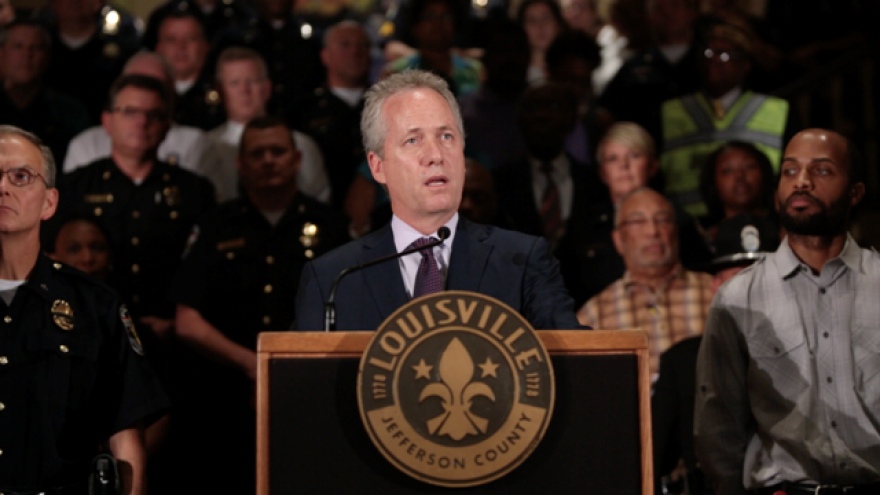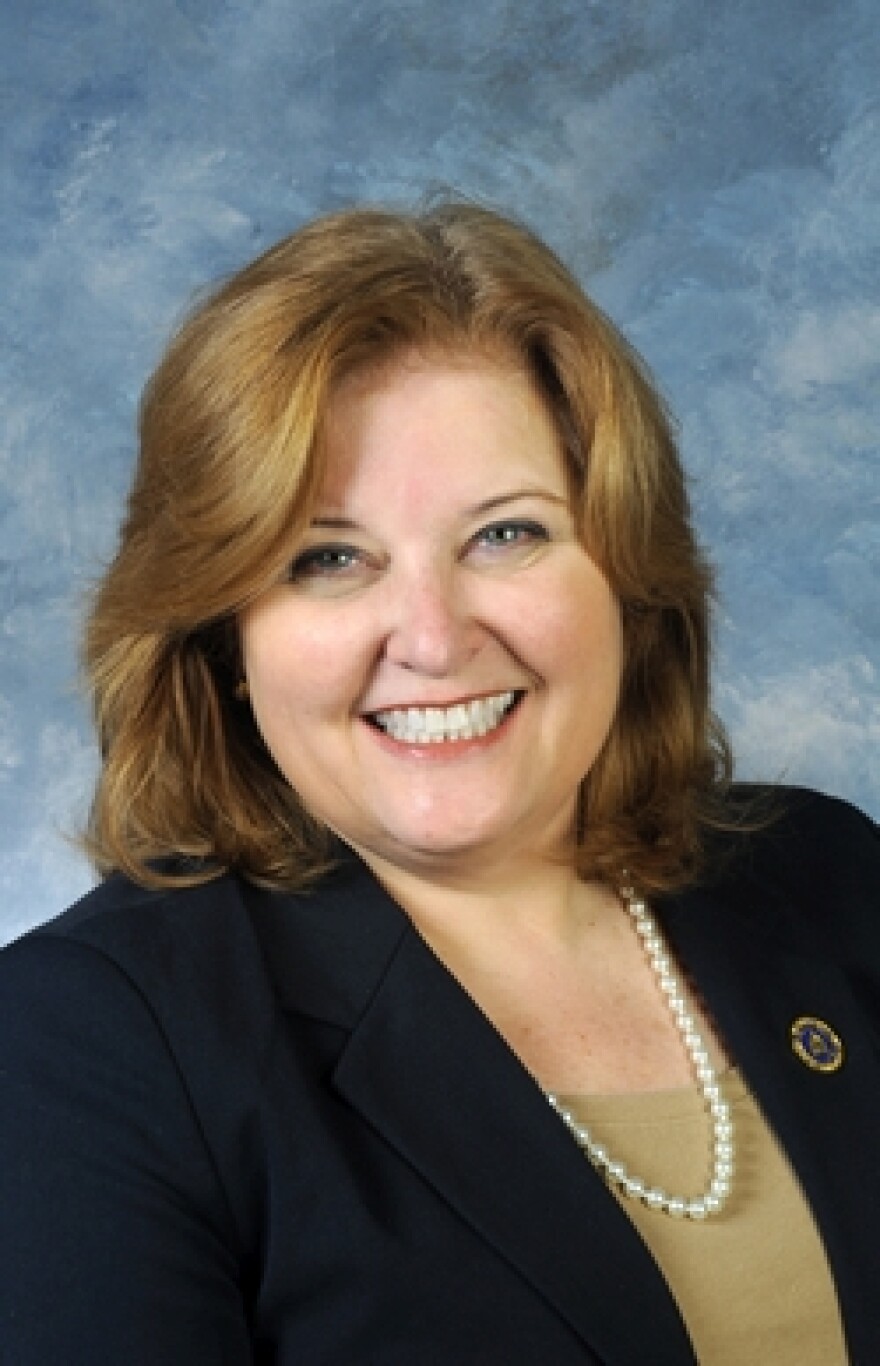Several state and local elected officials raised concerns about Louisville’s handling of rape cases in the wake of an investigation published by the Kentucky Center for Investigative Reporting last week. But Mayor Greg Fischer said he is confident that the Louisville Metro Police Department “places a priority on getting justice” for rape victims.
“That commitment shows in daily officer interactions with victims, and most recently, with the department’s successful pursuit of grant funding to support victim advocacy and training related to domestic violence, human trafficking and other ways to support victims,” Fischer said in a statement.
KyCIR’s investigation, “Prosecution Declined,” found that of 194 rapes reported to LMPD in 2017, only 30 ended in an arrest and only four adult defendants ended up with a rape conviction.
( Read our yearlong investigation: Prosecution Declined)
KyCIR found that sex crimes detectives take every rape case to a prosecutor before making an arrest, often early in the investigation. Prosecutors declined more than 40 percent of all rape cases, which police then cleared by exception.
To clear a case by exception, police must identify and locate a suspect, and have probable cause to make an arrest. But an exceptional circumstance beyond law enforcement’s control stops them from making an arrest. LMPD acknowledged that they didn’t meet all those conditions in the case that is the focus of the investigation, but cleared it by exception anyway.
Fischer did not comment on that finding.
In 2017, LMPD cleared nearly half of all rape cases by exception, mostly because the prosecutor declined to take the case. LMPD cleared 15 percent of rape cases by arrest, below the national average.
Police and prosecutors told KyCIR that this screening process helps build stronger cases. Fischer indicated he, too, thought the collaboration between police and prosecutors was a benefit.
“As your story says and national statistics show, these cases are often difficult to prosecute, which is why LMPD investigators are in continual communication with prosecutors,” Fischer said.
Other elected officials aren’t so sure.
“These are among the most serious, violent crimes that can be perpetrated in a community,” said Councilman Brandon Coan, a Democrat representing the Highlands. “We have a system that has a blind spot that needs to be fixed.”
State legislators representing Louisville echoed Coan’s sentiments.
“These numbers are pretty startling,” said state Rep. Joni Jenkins, a Democrat from Louisville currently serving as minority whip. “It’s something that cannot be ignored. This is something I would encourage the mayor and Metro Council to focus quite a bit of attention to.”
KyCIR’s investigation focused on the rape reported by Jen Sainato in January 2018. She was in town for business, staying in the Marriott downtown, when she says a man she met at the hotel bar drugged and raped her.
LMPD Lt. Shannon Lauder told KyCIR that police didn’t have enough probable cause to support an arrest, which is a requirement to clear a case by exception. Coan said that was concerning.
“We need to make sure that all of our law enforcement actions are according to laws and policy,” said Coan. “That's just a no-brainer.”
Six LMPD officers responded to Sainato’s hotel room after she reported she’d been raped. One asked her repeatedly how much she’d had to drink and called her hysterical. At one point, he put his hands on her upper arms like he was holding her in place.
“That shows a real lack of training,” said Jenkins, a former rape crisis counselor. “I don’t think we want any victim of any crime treated that way. But somebody who has been sexually assaulted, that can be retraumatizing to physically touch them in that way.”
That same officer said that night that he thought Sainato was “stupid drunk” and speculated that the sex was “consensual to a point.” He told his fellow officers that police are often called to hotels to respond to people who get drunk, invite people back to their room and then say they were raped.
Sen. Morgan McGarvey, a Democrat from Louisville currently serving as minority floor leader called the officer’s behavior “completely unacceptable.”
“I was so shocked,” McGarvey said about KyCIR’s investigation. “We are making these people victims all over again.”
Councilman Mark Fox, a former LMPD officer who represents parts of south Louisville, said police should approach rape victims with sensitivity.
“Even though that might be the 10th run you’ve made that night, at that time, [the victim] is the most important person in the world,” Fox said. “Police officers need to conduct themselves in a professional and caring manner whether they're responding to a sex crime or any other crime.”
He said LMPD officers as a whole do a phenomenal job, but it’s always important for them to remember that “words have meaning and actions have consequences.”
Fox said he was comfortable with the police bringing rape cases to a prosecutor to screen as long as they were doing thorough investigations first, which he felt they usually do. But he said no one, not even the prosecutor, should dictate whether police make an arrest.
Like others interviewed for this story, Fox said sex crimes are particularly challenging to investigate and prosecute. He said the city could consider setting up a resource for police officers responding to sexual assault calls, similar to the city’s Lethality Assessment Program. That’s a program that allows police officers to connect high-risk domestic violence victims with an advocate at the scene.
McGarvey, a lawyer, agreed that these cases are difficult.
“But when we have evidence that someone has been raped, we can’t give up because it’s difficult to prosecute,” he said. “Precisely because it’s difficult is why we should put more effort into providing justice for these people who have been hurt in this way.”
But he said finding the resources for that extra effort is always part of the equation amid city and statewide budget cuts.
“We need to provide victims of sexual assault with as much justice as humanly possible, and I’m not trying to make excuses, but I do think we’re asking good officers, good prosecutors, good judges to do a lot more with a lot less.”
If you have experienced sexual violence in Kentucky and want to talk to a reporter, call 502-814-6580.
Amina Elahi contributed to this report. Contact Eleanor Klibanoff at eklibanoff@kycir.org.











